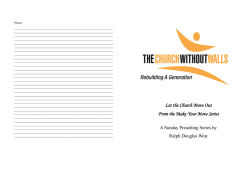
SUMMARY - Shodhganga
1 SUMMARY The Thesis entitled Philosophical Doctrines of Ralph Waldo Emerson : A study of his selected Poems and Essays has highlighted the different types of theories of his doctrines. This Research work has been designed to critically consider the spiritual and philosophical aspects. Emerson, a Unitarian Clergyman has made an exhaustive study of Christian theological thought. Purpose of Study : Every writer has different way of thinking to write something meaningful for the society, but Ralph Waldo Emerson was a one who draws his own path and tried to go deep into the orthodox ideas of ordinance of the Church. Being an Essayist and a Poet, Emerson was a true hero of his mythological era. He was never convinced by the dogmas and culture of religious background of his age. His theory was always appealing to the readers because it advances the readers to elevate their soul and tried to mingle with the Over-Soul and feel the actual essence of God. These considerations have prompted me to choose this topic for Ph.D. The Present Research work is divided into eight chapters. The first chapter Introduction and Influences effects the meaning of Doctrine and it throws the light on the life and influences of Ralph Waldo Emerson. 2 Emerson was born with religious background rather doctrinal thoughts in his blood. The Reverend William Emerson was a tolerant minister and polished gentlemen, but his ethic of work was more from Puritanism than from the contemporary Unitarianism. Emerson was born on 25th May 1803 on the Election Day in Boston. His father recorded the birth in his dairy and he entered the name of a boy Ralph Waldo, a name designed to gratify both his wife's family and his wife's brother. Three days later, his father recorded that it was a custom to carry the baby to the Church in her own arm to the baptized. When Ruth became the wife of William Emerson and became a mother herself, she gave much thought to the formation of the character of her own children. Ralph's father always conducted family prayers before breakfast and as soon as the children could talk each one recited or read a verse of scriptures of his own choosing. Mary played a very progressive role in all the children. But it was Ralph, who appreciated her most not because of her unusual upbringing and strange nature but because from Aunt Mary, Emerson got more than high counsels and the will to preserve letters in which they wrestled with great issue flowed between them. To her, he bared his private journals and she shared hers with him. The homely vigour, Emerson sought in prose, first he had from her as when Allen Gay wrote the words of Mary, 3 “I am emptied and peeled to carry some seed to ignorant which no idler wind can so well dispense.” (19) Emerson copied her letters into his journal as model of style and he sometimes adopted her ideas and her phrases. He resolved to study the language and read Herodotus, aristophanes and The Greek Tragedies. Plato had the profoundest influence on Emerson in his maturity. During his senior years, Emerson also took a course with Professor Ticknor on the history and criticism of French and Spanish literature. Professor Edward Tyrell was appointed to teach Rhetoric and Oratory in 1819. Emerson chose the topic on Socrates. For this essay, Emerson won second prize in the Bowdoin competition and received twenty dollars. He was also one of the fifteen contestants in the Boylston. Emerson read philosophy from Professor Levi Frisbric and Levi Hedge. He also studied the text books of William Paleys entitled Principles of Moral and Political Philosophy and Richard Prince's A Review of the Principle Questions and Difficulties of the Moral. Emerson served as a class-poet as it was a custom so he presented an original poem entitled An Harvard's Class Day. Emerson resolved to play of an ideal minister. It is a confession that he must force himself to be what he knows, he is not though and he issues different words. Cook. Reginald. L Observes: 4 He certainly did realize that being a clergyman, would not come easily or naturally to him. Instead of suspecting that his profession might be uncongenial to his nature. He regarded his deficiencies as simply weakness or immaturity of character which he might outgrow. It was his belief moreover he had not chosen it; it was forced upon him by circumstances. (114) Emerson married twice in his life. His first wife was Ellen Louisa Tucker. When Ellen died that was the saddest moment for Emerson. He wrote to Aunt Mary in the hours after Ellen’s death, “My angle is gone this morning and I am unhappy. I have never known a person in the world whose separate existence as a soul I could so readily and fully believe.” (L,I: 318) Lidian was his second wife. They married in 1835 and with her, he was blessed with the two children, Ellen (1839) and Edward (1844). Lidian has a very strong influence on her husband. This second marriage was less emotionally intimate than the first. The partners were both in their thirties, when they met. Philosophy is the discipline concerned with the questions of how one should live (Ethics) ; what sort of things exist and what are their essential natures (metaphysics), what count as a genuine knowledge (epistemology) and what are the correct principle of reasoning (logic). The word itself is of Greek origin Jacobson observes, “Philosophia is a compound of philos (friend or lover) and sophia (wisdom) so its 5 origin meaning lies that, Philosophy is a word which relate the lover of wisdom.”(231) Emerson’s philosophy is his own philosophy. He read the writers but his views are always his own. Many attempts have been made to compare the philosophy of Ralph Waldo Emerson with other system of thoughts. When it is compared with Theosophy, new point of view must be taken. Theosophy is not a philosophy but it is the root source from which all philosophies have sprung. He developed these ideas of philosophy with Katha Upanishads. The Second fundamental basic idea of Emerson’s Philosophy is found in his recognition of Universe as a boundless plane. The Third Fundamental preposition of the secret doctrine presents the picture of vast sweep of evolution, from the elemental kingdoms up to the holiest archangel, every spark that issues from that pure essence. The Over-Soul is intelligence and evolution consists of the enfoldment of the intelligence. The term ‘Doctrine’ in the scriptures means a teaching as well as ‘which is taught’. In singular term Doctrine refers to the Doctrine of Jesus Christ and in plural it refers to the teaching of men and devil. In In Memoriam, Jesus attributes his teachings to the father, This is my Doctrine that the father commandeth all men every where to repent and believe and this is the Gospel which I given into you that I came into the world to do the 6 will of the father and my father sent me that I might be lifted upon the loss that who so repenteth and is baptized.(339) The Theory of Revelation is shared by Prophet Joseph Smith but this truth, which is the part of the gospel known on earth in earlier times now lost, considered to be the historical part. Smith received and shared his doctrinal understanding line upon line from the time of his first vision in 1820 to his death in 1844. These were all his predictable methods. He has only the catalyst process of systematic examination of the Bible. Emerson also adopted the concept of Orpheus. Emerson’s first literary use of Orpheus is Locus Classic in nature rather the orphic poet stands for truth revealed by supernatural commission and a literal influx of the divine or at least for truth with the authority that Burke and Coleridge presumed in favour of ideas that have endured. Dewey John introduces the song of the orphic poets with these words, “I shall therefore conclude this essay with some traditions of man and nature, which a certain poet sang to me and which as they have always been in the world and perhaps reappear to every bad may be both history and prophecy.” (312) Imagination, Creativity and Circumstances played a major role in his poetic themes. The selection from Emerson’s poetry present in a wide spectrum, a variety in views and forms. His themes reflected in his ideas 7 and thoughts. Emerson was deeply influenced by the oriental thought. All these factors have made his style serious. His essays are neither mere flight of imagination nor pleasure of fancy. They are logical, condensed thought, like Bacon’s wisdom, but where as Bacon least bothers about morality, Emerson preserves moral standards like a saint and sage. The major influences on his style are those of pulpit and of orators such as Demosthenes, Socrates, Cicero, Burke, and Webster. No purely literary influence exerted over the youth of that day was marked than that of Wendell Phillips [1811 -1884), who was famous abolitionist and orator of his times. Emerson’s love of beauty and pure eloquence are said to have been born out of Phillip’s influence on him. The style of his essays can be compared with Francis Bacon. His essays are very much like, ‘Dispersed Meditation’, when at his best, his style becomes aphoristic and observes epigrammatic terseness. In a letter to Carlyle, he described his own style which is lapidary. He had a formidable tendency of style. His images are usual and symbols are used to convey abstract ideas. He had a powerful vocabulary. That is why Holmes wrote, “No writer ever had a more distinct verbal instinct. He fairly cares his words and phrases and shows in his treatment of them a pleasure, near sensuousness.” (239) 8 Rousing eloquences was also one of his main features of his style and his pattern is ‘Dialectical’ that is why some of his essays were shown the Transcendental Structures. He was the maker of a spoken word. Every sentence is addressed to the mind directly. It had a complete value of itself. Emerson was genius for his striking and memorable phrases. He is eminently quotable and his sentences are charged with gnomic wisdom. He gives the witty phrases and the sharp sentences. This is combined with his insight into the etymology of words. He states the scholars as speculative because they speculate or see. Emerson believes that in good writings words become art with things, and man with divine power. His key themes include action, beauty, God, man, mind, nature, poet, soul, spirit, thought, word, divine etc. The second chapter titled The Doctrine of Self-Reliance is a study of self-trust and self-faith of human beings.Emerson's challenge as a minister, lecturer, and essayist was to find fresh ways of naming and describing the age's new sense of personal power without relying on the institutional language of churches, schools, and politics. This was 'Individualism' or 'Self.' Lawrence Buell,conceived that 'Self' is sometimes used as a noun, noting the individual subject to his own contemplation or action, or 9 noting identity of person, “Consciousness makes every one to be what he calls self.” (87) Emerson began in his sermons to use 'self-reliance' by name, his listeners were fully aware that he refers not to one's lower, materialistic, egotistical 'self' but to one's higher principled, moral self. This concept is clear from the part of the epigraph of the essay SelfReliance published in 1841. Emerson took this epigraph from Fletcher’s Honest Man Fortune, that righteous man's soul is his guiding star and that a good soul earns all good from God: Man is his own star and the soul that can render an honest /a perfect man. (1-2) Emerson took this concept from Ancient Latin term. An Ancient Latin quotation precedes the essay, 'Ne te quaesiveris extra.' (Do not look outside of yourself for the truth) The quotation is an apt introductory aphorism for Emerson's essays, for it sums up the central idea of selfreliance. The Transcendental Philosophy behind it is that one should rely on his inner voice, his own intuition or instinct to make important decisions and put his life on righteous path. In other words the quotation says, 'rely on yourself'. Emerson follows the Latin quotation with an English quotation from the epilogue of a verse drama of playwright Francis Beaumont and John Fletcher, cotemporaries of Shakespeare. 10 This kind of self-reliance or God's reliance, Emerson had been preaching in his church. To reflect is to receive truth immediately from God without any medium. A trust in oneself is the height not of pride but of piety, an unwillingness to learn of any but God himself. He was the one who has a private door that leads him to the king’s chamber. Now that he was being compensated for Ellen's loss by an increasing sense of independence from worldly rewards, his own thinking became more daring, He says, “I am God's child, a disciple of Christ ... as far as any man becomes great, that he is thinks, he becomes a new party.”(Note Books,66-68) The third chapter titled The Doctrine of Over-Soul emphasis the importance of God and his existence in the world. The soul which is above and high from other souls is called, The Over-Soul. This is Omnipresent, Omniscient, Omnipotent. God is the Over-Soul. God is that supreme power who commands the entire universe. As it is clear in the Bible that in the formation of human being it took long time to make Adam. The theory of God, the creation of human in the form of Adam is still endless. There is always one creator in which the world exists. According to Emerson, God is an immanent and an indwelling property of human being and his physical nature is not located in some other worldly realm. In the view of Emerson knowledge of God in 11 scholastic philosophy is maturing cognition, 'morning knowledge'. A believer, a mind whose faith is unconsciousness is never disturbed because other persons do not yet see the fact he sees. To make his knowledge more wider, Emerson made books his friends and read Plato, Socrates, Montagne, Machiavelli, Cardinal De Ritz and Adam Smith. Emerson believed that he himself was only destroying, 'Idolatrous propositions' which stood in the way of complete trust in God. In his Address to the Divinity School, Emerson observed the man on whom the soul descends through whom the soul speaks alone can teach the religious ecstasy. His ideas towards religion had increased to such an extent that the college authorities feared from him and believed that he was insane. He told that Historical Christianity has fallen into the error that corrupts all attempts to communicate religion. As it appears to us and as it has appeared for ages, it is not a doctrine of the soul but an exaggeration of the personal, the positive the rituals. It has dwelt with noxious exaggeration about the person of Jesus. The eastern monarchy of Christianity that indolence and fear have built the friend of man is made the injurer of man. Emerson accepts at some extent that 'Jesus Christ belonged to the true race of prophets.' He saw with open eye the mystery of the soul. He saw that God incarnates himself in man and evermore goes forth a new to take the possession of his world. Hudant Robert said 12 in the words of Emerson, “I am divine through me, God acts, through me speaks, would you see, God see me or see thee when thou also thickest as a I now think.” (125) As a Minister, Emerson made the right liberal protestant points about faith. Between 1823, he took notes from The Edinburgh Review on India's Vast Goddry. In 1830, he found the title evidence of an interest in Hinduism and Buddhism. He did read philosophic system by De Gerando and noted the following, “Idealism a Primitive Theory, The Mahabharata one of the sacred book in India.” (58) In 1837, Emerson lectured on so many topics of religion which honours Confucius, The Vedas, The Institute of Manu, Jesus and Plotinus as are the voices of pure reason. Emerson's mature thought began to crystallize when he seized on the ideas of God, when he found himself in the trauma due to his first wife’s death. Agree with the view point of Coleridge's Theory of Reason and The Magisterial Overview of the History of Philosophic System by Joseph Marie De Gerando and Victor Cousin who seemed to confirmed himself that the concept of Ancient Greeks and Indians consists that there is a unity of mind and soul in the form of varied individual. The most important quality occurs in Emerson is that being admired with Hinduism, he never learned Sanskrit, never visited a temple perhaps never ever met a practicing Hindu or Buddhist. But he purely managed to 13 orientalized himself well enough. As an American he was the one who fully realized the philosophical significance of Asian thought. As a youth Emerson mainly imbibed the cartoon images of oriental despotism strange chants, rituals, self-sacrifice at the festival of Jaggannath and Sati importation of widows on their husband's funeral pyres. The fourth chapter titled The Doctrine of Individual-Soul signifies the relationship between the Individual-Soul and Over-Soul in this world. Emerson had accepted the key elements of the doctrine of Samsara worldliness. In the early 1820s, he had embraced the idea of Moksha, Salvation, the goal of the spiritual life. By the late 1820s, he had independently developed the Principle of Compensation, subsequently discovered its coincidence with India's Theory of Karma. During the 1840s, he accepted the theory of Maya as the explanation for the ignorance that precedes enlightenment. Now to be in full accord with the picture of life presented by Samsara, he had only to adopt the Principle of Transmigration. While it was not until 1844 that Emerson accepted the Principle of Transmigration, he had learned of it long before, and had consistently found it of interest. Recall that Emerson encountered the idea of transmigration as early as his Harvard days, when he read Charles Grant's Poem on the Restoration of Learning in the East. He made use of the 14 Pythagorean opinions and their faith: In this regard Christopher Reidweg says: “The soul is an emanation of the Divinity, a part of-the-Soul of the world, a ray from the source of light. It comes from without into the human body, as into a momentary abode. It goes out of it a new. It wanders in ethereal regions, it returns to visit it. It passes into other habitations for the soul is immortal.” (120) In Hindu Metaphysics, 'Samsara' is the Cosmic process by means of which the soul is continually reborn until it finally achieves moksha rending the veil of maya through the direct experience that all is Brahma. In the process of death and rebirth, the deeds done by an individual in previous life times and their consequences, his or her karma, determine, the conditions of the present life time. Thus all incarnate beings live in the realm of 'Samsara' and are subject to the spiritual laws which rule and guide that realm. Its purpose is to bring all souls to enlightenment. turned to eastern religion from where the dawn comes. He turned to the Katha Upanishad and The Gita, The Vishnu Puranas and The Laws of Manu. According to his biographers, he studied the Vedantic Philosophy in Germany in 1832 and later in America. German idealists of younger generation were already studying the Hindu scriptures. They were convinced by the Upanishadic doctrine of the self also called the soul which is immortal. Most of Germans of younger generations satisfied 15 with the views of Shelly who wrote in the poem Adonias in 1821 about self and soul, “The one remains, the many changes and pass.” (Jones. Ferdrick, 152) According to Upanishads the soul consists of the principles of matter, energy and intelligence. The unity of matter, energy, and intelligence is Brahma. The universe comes and goes back into the 'Brahma'. The universe is governed by the Laws of Brahma or 'Parmatma'. Emerson calls it over soul. The Universe together with the ‘Paramatma' is called macrocosm. The Brahma reflects itself in every individual and is called the 'Atma' and this Atma is composed of the subtlest form of matter. It is animated by the substlest form of energy called the ‘Prana’. It is illuminated by Brahma. The purpose of this soul is elevation and is to reach God. This 'Atma' is in human body. Body dies and it goes to another body according to 'Karmas' or thought and when it is in the rounds of births and deaths it is called ‘Samsara'. The egotism of the self does not let it reach the Over-Soul or God. The fifth chapter titled The Doctrine of Efficient Nature shows relationship between God, Man and Nature. Nature is a word used in two major ways: Science and Metaphysics. They are inter connected in a complex way. This complexity is due to the importance in the history of science and metaphysics particularly in western civilization. To modern 16 scientific writing, “Nature refers to all directly observable phenomena of the physical or the material universe and it is contrasted only with any sort of existence such as spiritual or supernatural existence.” Williams, 150) (Jevons Stantly Historically nature does not include all things because it excludes the artificial or man-made. In this case, the unqualified term, nature generally means the same as wilderness or natural environment. Even the oldest meaning which is compatible to some extent with both of these is also common. Nature refers to the essential properties of any particular type. Nature is the external part of universe. The vision of nature is so high that it nourishes the body of all humans. It treats one like a mother who cares her children in every way, latin proverbs says, “Nature Genetic; which means nature is our mother.” (Harris Williams, 320) Emerson understands nature in more wider sense from his boyhood. As Whicher Stephen quotes Emerson’s words in his freedom and fate: An Inner Life of Ralph Waldo Emerson, “When I was a boy, used to go to the seas and pick up shells out of the sand which vessels had brought as ballast and also plenty of stones. Gypsum, when I discovered would be luminous when I rubbed two bits together in a dark closet to my great wonder to me.” (129) Emerson puts nature to test in the spring walking thirty miles to North borough with William. They stayed at a farm house, near pond, wandered in the adjacent woods where they read 17 books which they had brought with them. Emerson would not have understood nature at his young age if his Aunt had not coaxed him to understand Nature. She nurtured him because her own sensitivity to the beauty of nature was very sharp. In the terms of science Emerson's inquiry took him deeper into consciousness, intuitive experience and ultimately philosophical idealism. While noting the popular association of science with scepticism, he illustrated that in modifying and enlarging the Doctrine of theology, science does not have so much effect in terms of Astronomy. He describes, the real text of this sermon is nature, to which he immediately draws the congregations and attention by enumerating a series of useful reflections on the remarkable spectacle of a recent solar eclipse, the grandeur impression upon all men. As Franzier noted Emerson’s words, “Nature is joy and pride in the powers of the human intellect that predicted the eclipse which is quickly subordinated to a better reflection that this human mind is but a derived light from the sources of wisdom a yonder sun. This metaphorical reflection explicitly into the problematic of natural theology.” (336) It is only the knowledge of God that unites this bright outward creation to the brighter inward creation of intelligent mind and in this way the God of Nature and God of Bible are the same. As a Unitarian 18 Minister, reading the book of nature, Emerson does not go far as he would go in a few years. when in the lap of nature, he indistinguishably blends Scientific objectivity and religious enthusiasm through the natural symbol of light. According to Emerson, Nature is the gospel of new faith. He opens his ideas with the current distinction between the Me and Not Me theory, The Soul and Nature. The Me is that part in which man partakes himself with the divine world. The Not Me is that external part in which Me is in relation. Emerson reality lies in the projection of God and he tried to maintain a proper relationship between God, Man and Nature. The Sixth chapter titled The Doctrine of Reason implies with the theory of Emerson’s moral sense. The Doctrine of Reason becomes wider when intellectuals intervene in public controversy. Emerson is remarkable for injecting even into his activist pronouncements; his extreme distaste for having indulgence into other boundaries of religion. Most discussion of Emerson as reformer boils down to whether, when and to what extent he actively furthered reform efforts. The debate is understandable at historical movement, when the proper relation between scholarly and political work has become the major effort done by Emerson. In order to grasp what is most distinctive and instructive about Emerson as an intellectual, who eventually entered the political arena, he 19 must focus less on adjudicating what he did. Emerson criticizes U.S. materialism, but mostly he reverses this negative stereotype of Yankee culture by throwing the insult back across the Atlantic. The theory of reason inherent in the human psyche seemed to synchronize with the synoptic comparative treatments of the worlds. The Post enlightenment histories of Victor Cousin and Marie Joseph de Gerardo influenced in Emerson’s mind. These seemed to corroborate the existence of a universal mind that transcended cultural borders. In the traditional syllabus with which Emerson started the non-Christen analogue that impressed him most with Gerardo’s Comparative History of the System and Victor Cousin’s, Introduction to the History of Philosophy which directed him to Asian thought as well. Emerson as optimistic individualist appealed to conservative minds as a rock-solid embodiment of American values. His popular mythology has become a rhetorical symbol who depend one mind and rose above or transcended the messy world of social unrest. Reason is commonly cast as a vast product of the individual to be harnessed and utilized by the individual. Emerson, however uses the word ‘Reason’ to propagate his own understanding of his concept. The seventh chapter titled The Doctrine of Correspondence shows the divine impulse to every Individual-Soul. The first question to be 20 considered in reference to the subject of the divine impulse is, where does every impulse come from? Every movement, every vibration, every motion has one source, that is ‘God’. The word means vibration and vibration means movement. In Vedanta, Brahma means sound. Vibration was the first or original aspect of Brahma, the creator. From the Metaphysical point of view there are different rhythms describing the conditions of man. In Vedanta ‘Sattva’, 'Rajas' and ‘Tamas' follow a certain rhythm. Sattva is a harmonious rhythm; Rajas, a rhythm which is not in perfect harmony with nature and Tamas is a rhythm which is chaotic by nature and destructive. Every impulse that comes to man while he is in this chaotic rhythm is followed by destructive results. Any impulse coming to a person when he is in the rhythm of Rajas is accomplished but the impulse that comes when he is in the rhythm of Sattva is inspired and is in harmony with the rhythm of Universe. The active life of man gives little time for concentration and for putting mind and body into the condition in which he can experience the rhythm that gives the inspiration and meets the will of God. The experience comes in the prayer of God. With perfect harmony between mind and body one can touch a certain pitch which is harmonious and heavenly. The divine impulse is an impulse full of love. It gives happiness. It is creative. Regarding this Marcus Aurelius has rightly 21 expressed in Brainy quotes that, “To live happily is an inward power of the soul.” (3) The concluding chapter Conclusion sums up the whole work. Emerson provided his doctrines with a vision of the living universe and the mystic core of human nature. He made endless effort to bring spiritual vision to everything. His philosophy tried to erase that deep rooted despair of the modern mind that causes lie to lose its purpose and aim. The essays and poems of Emerson are touched with the quality of stillness and hope. He emphasized that this universe is governed by moral spiritual laws and there is always a hope to know that laws. This ‘hope’ is the only way to attain potential power to know the truth. Reading Emerson means to know culture, to know psyche, to be away from illusions and arrogant fantasies and to touch the nobility. As Emerson believed in search of truth and supremacy of thought, his poems and essays convey his thirst for reality and crave for moral and spiritual development. For this he tried all his life. He appears as an optimistic before us as he has strong faith with in him. This faith was possible for him because he believed in knowledge, virtue and beauty. These values suggested the reality of God. Since only God is real for him. 22 References: Bowers, Fredson. The Dramatic Works in the Beamount and Fletcher Canon. Cambridge: Cambridge University Press, 1996. Print. Cook, Reginald. L. The Selected Prose and Poetry. USA: Middle Bury Press, 1989. Print. Douglas, Mac Arthur. Brainy Quotes. USA: Books Rags Press, 2001. Print. Frazier, Nash Roderick. The Rights of Nature: A History of Environmental Ethics. Wisconsin: The University of Wisconsin Press, 1989. Print. Geldard, Richard G. The spiritual Teachings of Ralph Waldo Emerson. Houghton : Lindisfrane Book, 2001. Print. Gilman, Wm. The Journals and Miscellaneous Notebooks of Ralph Waldo Emerson. Cambridge, MA: Harvard University Press, 1960. Print. Harris, William. Views on Nature. Oxford: Middle Bury College Press, 1998. Print. Hudant, Robert. The Aesthetics Of Ralph Waldo Emerson. Cambridge: Mellum Press,1996. Print. Jacobson, David. Emerson’s Pragmatic vision. Cambridge: Harvard University Press, 1995. Print. Jevons, William, Stanley. The Principle of Science at Treatise on logic and Scientific Method. Ed. Ernest Nagel. London: Oxford Press, 1993. Print. Joel, Myerson. A Historical Guide to Ralph Waldo Emerson. New York: Oxford University Press, 2000. Print. John, Dewey. Philosophical and Education. Chicago: Chicago University Press, 1892. Print. Lawrence, Buell. Ralph Waldo Emerson: A Collection of critical essays. Engle Cliffs, NJ: Pretence Hall, 1993. Print. Ralph, Rusk L. The Life of Ralph Waldo Emerson. New York: Scribner, 1949. Print. Riedweg, Christopher. Pythagoras: His life,Teaching and Influence. Comell: Comell University, 2005. Print. 23 Windell, Holmes, Oliver. The Essential Writings of Ralph Waldo. New York : Modern Library Press, 1891. Print.
© Copyright 2026





